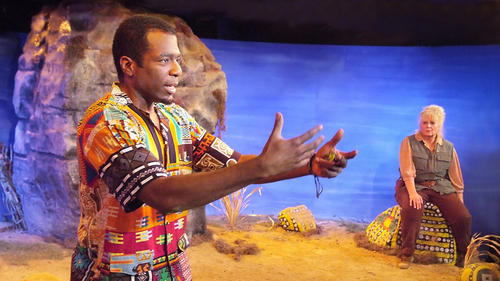
The Painted Rocks at Revolver Creek is the seventh play by Athol Fugard to be done at the Fountain Theater, an Equity-waiver company now in its 25th anniversary season. The relationship between playwright and producer has been a fruitful one. Each of Fugard’s previous plays has been warmly received by critics and audiences; it should be no different with Painted Rocks, a compelling drama about the work and legacy of a South-African black folk artist named Nukain Mabuza (Thomas Silcott).
The latter, an impoverished farm laborer, spent about fifteen years in the 60s and 70s painting colorful designs on the rocks in a barren field in the eastern province of Mpumalanga (home to many Afrikaners). Like L.A.’s Simon Roda, the Italian-born working-man who single-handedly built the Watts Towers, Mabuza doggedly pursued his vision of a “Garden of Flowers,” often giving up eating so that he could buy paint. In Fugard’s fictional portrait, Mabuza is an old man, worn out by his toils and by the cruelty and racism of the white ruling class (the first act is set in 1981, when apartheid was in effect). Mabuza, unable now to work his magic with the brushes, urges his youthful assistant Bokkie (the charismatic Philip Solomon) to paint a big boulder for him, turn it into a self-portrait. That doesn’t sit well with Elmarie (Suanne Spoke), the tough Afrikaner farm-owner for whom Mabuza and Bokkie work. Annoyed by Bokkie’s cheekiness (which reminds her of the rebellious black students in Johannesburg) and discomfited by Mabuza’s decision to “tell his story” rather than opt for mere decoration, she orders them to do her bidding. Oozing arrogance and condescension, Elmarie flaunts her power and prejudice (which she tries to mask by quoting smarmily from the bible). The second act takes place in 2003, ten years after South Africa threw off white rule. Mabuza is dead (in real life, he committed suicide) and his garden of flowers is now in disarray, colors faded and forlorn. But Bokkie is still alive. Grown up, using his own name, Jonathan Sejake (Gilbert Glenn Brown), he shows up to pay tribute to Mabuza by repainting his story on the boulder. Elmarie, now carrying a pistol and seething with hatred for the new, multi-racial South Africa, tries to chase him off her farm, relenting only when she learns who he is. What follows is an extended argument between Jonathan (a teacher) and Elmarie over the place of whites like her in a largely black society. The issue is a life-and-death one: other Afrikaners have been killed over land disputes (even though the new constitution is supposed to protect their property rights). Elmarie, whose husband has been felled by a stroke, is not going to go down without a fight. Jonathan stands up to her in a forceful way, reminding her of all the shame and humiliation he (and Mabuza) experienced under apartheid. He also tries to point out the way to reconciliation, a recognition of their common humanity.
Fugard writes with his customary power, wisdom and compassion in Painted Rocks, giving us a play that touches both the heart and mind.
Ably directed by Simon Levy, masterfully acted by the four-person cast (on an impressive set by Jeffrey McLaughlin), the play is a winner.
